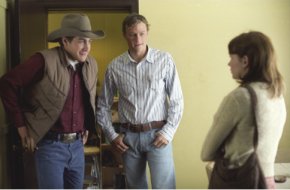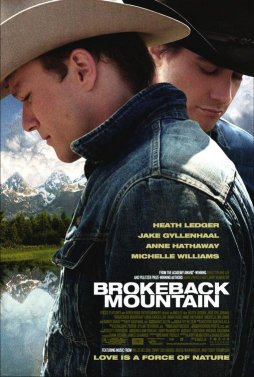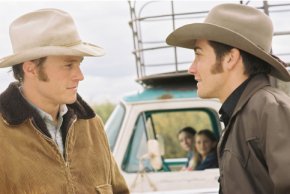|
Brokeback
Mountain
Set against the rolling mountains and cloud strewn skies
of Wyoming in 1963, Ang Lee’s Brokeback Mountain
depicts the budding relationship between a ranch hand and
a rodeo cowboy who spend a summer tending sheep atop a mountain
from which the title originates.
As reported
to death in the media, Jack Twist (Jake Gyllenhaal) and
Ennis Del Mar (Heath Ledger) fall in love with one another,
igniting the screen with gay love that many believe the
world is not ready for…yet.
For
months, speculation has been building. With each trailer
screened in theaters, chuckles and giggles were evident
at the thought of Jake and Heath kissing one another, let
alone falling in love. Unfortunately, this has become the
story, trumping the fact that what has been unleashed into
theaters is not just a testament to love, but also a tribute
to humanity, longing, and remorse for losing the “one
that got away.”
Said
pining has existed on screen for ages, the only difference
is that this time it involves two men, instead of the more
traditional, and conservatively acceptable, male-female
combination.
This
review isn’t about political agenda pushing or pleas
for tolerance, although one would hope an open mind would
be easier to find these days. Instead, we must look at the
merits of the film released, which underneath all of the
hotbed discussion is something far more engaging and beautiful.
When
introduced, Jack and Ennis are the picture of legendary
cowfolk: quiet, stoic, and deeply contemplative. They embody
everything we’ve come to expect from cowboy imagery,
and when they take their places atop Brokeback Mountain,
they engage in a two-man routine that is arduous and trying.
One must pitch a pup tent nightly and sleep amongst the
herd while the other maintains base camp, minding supplies
and preparing meals.
The
situation is rugged, but it is domestic in an oddly natural
fashion. Jack takes to tending the herd initially, while
Ennis prepares meals and orders supplies. As the days turn
into weeks, these two slowly start to open up to one another
over whiskey and a warm fire.
It is
important to note that neither Jack nor Ennis are fully
aware of what is growing between them. Their dependence
on one another helps things along, but this is something
far more endearing than mere camaraderie. When the bough
finally breaks and Jack and Ennis finally succumb to desire,
Ennis is the first to retreat into defense, insisting that
what they share is a one-time thing, restricted to the sanctity
of Brokeback Mountain.
A lesser
film would have dwelled on this setup, being content focusing
on the simple drama of a man who accepts this relationship,
but fears ridicule and more should their love be exposed.
Instead, Ang Lee’s film dives deeper into the psyche
of human melodrama, owing likely to the characterizations
of Annie Prouxl’s short story which served as inspiration
for the film, and in turn taps into something so humanly
universal that it transcends the boundaries of straight,
gay and any other sexual preference.
Ennis
and Jack go their separate ways following their stint on
Brokeback, and each one dives into what they believe is
best for one another. Ennis marries Alma Beers (Michelle
Williams) and begins building a family in near desolation
and poverty. Jack pursues his dreams of becoming a rodeo
cowboy to little avail, and winds up ensnared by Texas rodeo
darling, Lureen Newsome (Anne Hathaway).
As each
man strives to do right by their respective others, the
call of longing proves too strong for either to control,
so they resort to frequent fishing trips in Wyoming, masking
their romance and love for one another amongst the trees
and streams of nature. Pointedly, Jack and Ennis cannot
fully understand what is happening between them, and this
lends to the idea that sometimes people just fit. It’s
difficult to find someone you click with, and when you are
fortunate enough to the feeling of losing that special person
is plaguing and haunting. Jack and Ennis found one another,
but are torn apart from one another due to societal constraints.
 |
One
aspect of the film that stands out amongst the longing is
Ang’s representation of wind in Wyoming, which billows
and blows with a force that most of us West Coasters aren’t
accustomed to. Part metaphor for Jack and Ennis’ relationship,
the wind seemingly represents that which we cannot control,
as Jack and Ennis each find themselves swept up in something
they cannot explain, nor wish to.
Lee’s
portrayal of this doomed love is touching in a very humane
way, moving to the core, and deeply affecting. Larry McMurty
and Diana Ossana’s screenplay makes sure to note the
complications of this relationship from all angles, depicting
the struggles of not only Jack and Ennis, but of the women
in their lives as well. Ennis particularly becomes ensconced
in troubled relationships with women, beginning with Alma,
briefly with Cassie Cartwright (Linda Cardellini), and ultimately
culminating in his ties to his eldest daughter, Alma Jr.
(Kate Mara).
It’s
this detail that helps signify the importance and focus
on human relationships, not merely the telling of a tale
between to men who fall passionately, if fatedly, in love.
Rating:

|








